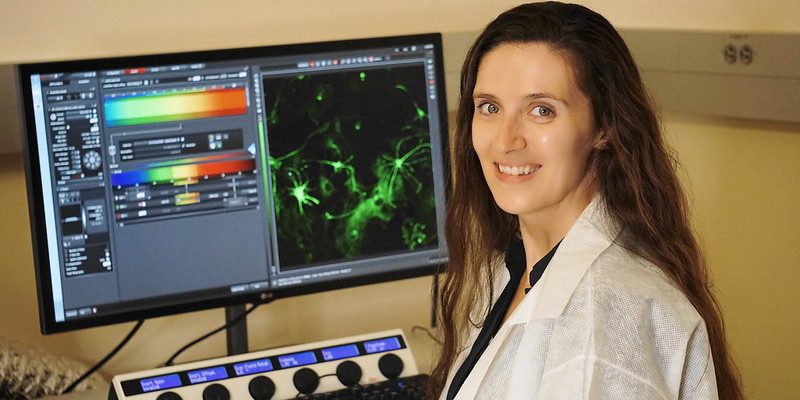
Megan Lantz, armed with her new PhD in Cell and Molecular Biology, said she found her experience in Dr. Robert Nichols’ laboratory at JABSOM to be exhilarating, and one she will remember with fondness. Nichols said that since the start of the pandemic last year until she finished her dissertation research early this year, Lantz found a way to be exceptionally productive, despite COVID restrictions for working in the lab and her having to juggle her time with a baby at home and no available daycare.
“She came in at all hours and on weekends, when she could,” Nichols said. “This was an extraordinary effort by a truly dedicated scientist-in-training.”
“The independence my advisor Dr. Nichols provided me to make decisions regarding the direction of my research project fostered within me a greater interest for my project, and to develop skills that I will use throughout my career,” Lantz said. “Additionally, I found the willingness of the other faculty, staff, and students at JABSOM to take an interest in my research and education not only fundamental to my success as a Ph.D. student, but also very exciting to me as well.”
 Lantz says she chose to study at JABSOM because she was interested in learning more about the neuroscience program offered by its Cell and Molecular Biology department. She had earned her BS in Biochemistry from Texas Christian University and an MS in Chemistry from the University of Utah. She was excited to apply her knowledge gained during her previous studies to tackle important research in the field of neuroscience.
Lantz says she chose to study at JABSOM because she was interested in learning more about the neuroscience program offered by its Cell and Molecular Biology department. She had earned her BS in Biochemistry from Texas Christian University and an MS in Chemistry from the University of Utah. She was excited to apply her knowledge gained during her previous studies to tackle important research in the field of neuroscience.
Lantz’s hope is that her research on Alzheimer’s disease, a complicated disorder involving several cell types and biological pathways, can be used as a stepping stone for other and future researchers to build upon. She said she believes the recent paradigm shift in this field of research to include cells other than neurons is beneficial to ultimately finding a cure as it creates opportunities for novel treatments and provides a more holistic view of the disease.
“My grandfather has dementia and watching him slowly fade from a lively social person to someone who is withdrawn and easily confused, breaks my heart. It is what motivates me to pursue a cure and prevent others from the same fate,” she said.
Lantz’s research in the Nichols’ lab focused on using small protective fragments of a peptide that accumulates and induces toxic effects in Alzheimer’s disease using two types of non-neuronal cells called glia that are vital to maintaining a healthy brain environment. Mitigating the toxic effects induced by chronic activation of these cells will slow the progression of Alzheimer’s disease by reestablishing the neuroprotective functions exerted by the non-neuronal cells and decreasing neuronal death.
“Megan came to our lab with a strong background in biochemistry and laboratory research, well equipped to take on the challenge of a new direction in our research program to study neuroinflammation in the context of Alzheimer’s disease,” Nichols said. “In doing so, Megan developed an extensive knowledge base and new approaches for the study of glial cells, which, in addition to her own work, sparked several offshoot projects taken on by new members of the lab. As such, Megan has been a terrific example and outstanding mentor to the new lab members. Megan is thoughtful, inquisitive, always positive and invariably helpful. It has been a pleasure and privilege having her in our lab.”
Lantz says she has enjoyed almost all aspects of my research: “I love making new friends and learning from, sharing with, mentoring, and collaborating with other researchers. I also enjoyed learning new techniques, isolating and working with various cell types of the brain, and the excitement of getting quality data and challenging myself to become more comfortable and confident in sharing my research results with others.”
“My graduate experience has taught me better time management and communication skills. It has given me a plethora of opportunities to collaborate with other researchers, to mentor or teach undergraduate and graduate students, and to begin to establish a network which will be beneficial in my future career,” Lantz said.
While studying at JABSOM, Lantz and her husband became passionate about helping others and the community. They volunteered at a local farm sanctuary in Kaneohe every weekend for more than a year. She also found time to enjoy Oahu by going on hikes or spending time at the beach.
“My advice [to incoming graduate students] would be to find a balance between your classwork and research, and your hobbies and interests. Graduate school is challenging, but very rewarding,” Lantz said. “The key to my success was making friends with my fellow classmates as well as some of the more senior students in the CMB program, always being open to learning opportunities, finding mentors to guide me through the various steps and disciplining myself to take at least 30 minutes each day to study for classes or read research articles. Also, I would say go outside and enjoy Hawaii!”